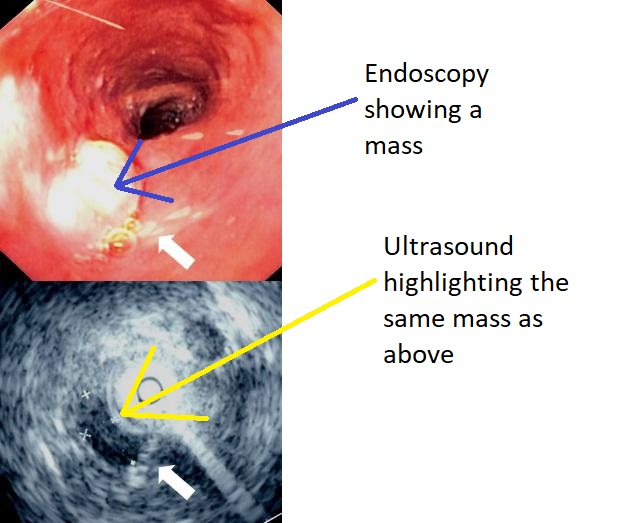Esophageal cancer other diagnostic studies
|
Esophageal cancer Microchapters |
|
Diagnosis |
|---|
|
Treatment |
|
Case Studies |
|
Esophageal cancer other diagnostic studies On the Web |
|
American Roentgen Ray Society Images of Esophageal cancer other diagnostic studies |
|
Risk calculators and risk factors for Esophageal cancer other diagnostic studies |
Editor-In-Chief: C. Michael Gibson, M.S., M.D. [1]Associate Editor(s)-in-Chief: Hadeel Maksoud M.D.[2]
Overview
Other diagnostic studies for esophageal cancer include FDG-PET (positron emission tomography) scan and endoscopic ultrasound (EUS).
Other Diagnostic Studies
Fludeoxyglucose Positive Emission Tomography
FDG-PET (positron emission tomography) scan is also being used to estimate whether enlarged masses are metabolically active, indicating faster-growing cells that might be expected in cancer. Esophageal endoscopic ultrasound (EUS) can provide staging information regarding the level of tumor invasion, and possible spread to regional lymph nodes.[1]>[2]
Esophageal Ultrasound
EUS is the most accurate investigation for regional staging of esophageal cancer. It is capable of correctly staging T and N stagesin 90% of patients.[3]

References
- ↑ Cheedella NK, Suzuki A, Xiao L, Hofstetter WL, Maru DM, Taketa T, Sudo K, Blum MA, Lin SH, Welch J, Lee JH, Bhutani MS, Rice DC, Vaporciyan AA, Swisher SG, Ajani JA (2013). "Association between clinical complete response and pathological complete response after preoperative chemoradiation in patients with gastroesophageal cancer: analysis in a large cohort". Ann. Oncol. 24 (5): 1262–6. doi:10.1093/annonc/mds617. PMC 3629896. PMID 23247658.
- ↑ Arnett AL, Merrell KW, Macintosh EM, James SE, Nathan MA, Shen KR, Ravi K, Neben Wittich MA, Haddock MG, Hallemeier CL (2017). "Utility of 18F-FDG PET for Predicting Histopathologic Response in Esophageal Carcinoma following Chemoradiation". J Thorac Oncol. 12 (1): 121–128. doi:10.1016/j.jtho.2016.08.136. PMID 27569732.
- ↑ Lee WC, Lee TH, Jang JY, Lee JS, Cho JY, Lee JS, Jeon SR, Kim HG, Kim JO, Cho YK (2015). "Staging accuracy of endoscopic ultrasound performed by nonexpert endosonographers in patients with resectable esophageal squamous cell carcinoma: is it possible?". Dis. Esophagus. 28 (6): 574–8. doi:10.1111/dote.12235. PMID 24835402.